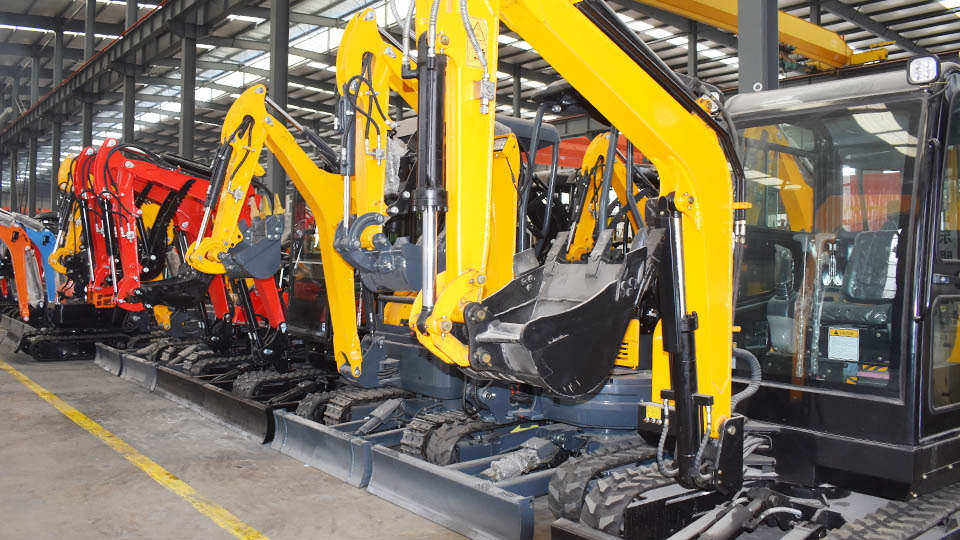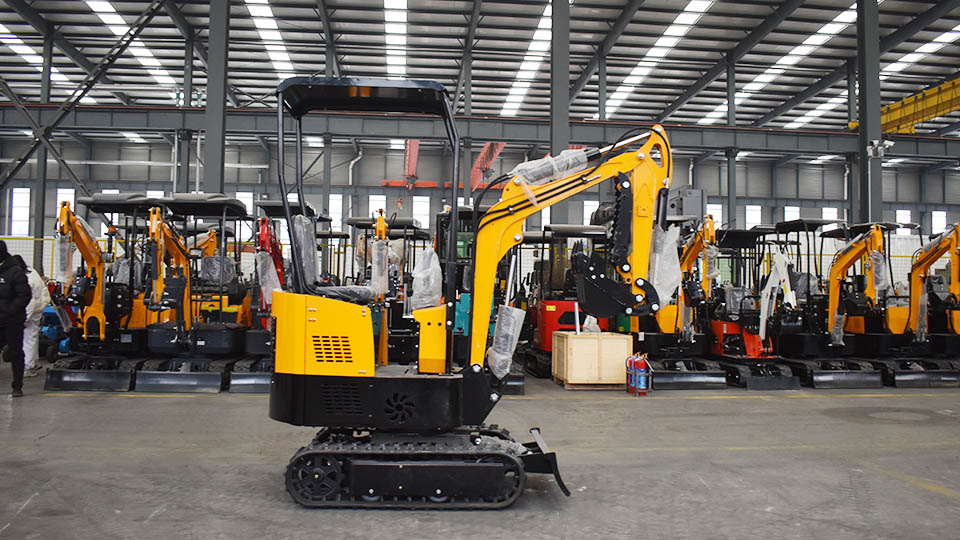1. The Auction House: A Contractor's Bidding Arena
Heavy equipment auctions are perhaps the most well-known and direct route to finding excavators at wholesale prices. These events, whether physical or digital, are where surplus, repossessed, or retired machinery is sold to the highest bidder. The sheer volume of equipment available makes them a prime hunting ground for contractors.
Online Auctions
The rise of online auction platforms has democratized the process, allowing contractors to bid on excavators from anywhere in the world. Companies like Ritchie Bros. Auctioneers, IronPlanet, and Purple Wave dominate this space.
How it Works: These platforms list a vast inventory of excavators with detailed specifications, high-resolution photos, and, most importantly, comprehensive inspection reports. A third-party inspection is a crucial element of the online auction model, as it provides a neutral assessment of the machine's condition, from engine hours and undercarriage wear to hydraulic system integrity and cab functionality.
The Advantage: The primary benefit is access to a global market. A contractor in Kansas can bid on a low-hour machine from a fleet in California, or even a surplus unit in Germany. The no-reserve format of many of these auctions means the final price is determined by the market, often leading to a true wholesale value.
The Risk: The "as-is, where-is" nature of auctions means there are no warranties. A contractor must be meticulous in their research, studying inspection reports and history carefully. While the online platforms strive for transparency, there is always an element of risk, and a missed detail can lead to costly repairs down the line.

Physical Auctions
Traditional live auctions, like those held by JJ Kane Auctions or local and regional auctioneers, still hold significant appeal.
How it Works: Contractors attend these events in person, where they can physically inspect the equipment. They can start the engine, check for leaks, test the hydraulics, and get a true sense of the machine's condition before the bidding starts.
The Advantage: This hands-on approach minimizes risk. A contractor can spot a subtle engine knock, a worn-out pin, or a loose slew bearing that might not be obvious in an online inspection report. The atmosphere of a live auction can also be a unique experience, with prices sometimes falling below expectations if a piece of equipment doesn't attract as many bidders.
The Risk: The inventory is limited to what is available at that specific location on that day. Travel and transportation costs can also add up, especially if a contractor has to travel a significant distance for an auction that doesn't yield a suitable machine.
2. Dealership Networks and Wholesale Brokers
Not all equipment sales happen in the open. A significant portion of the wholesale market operates behind the scenes, within the established networks of dealerships and specialized brokers.
Dealership Wholesale Divisions
Major heavy equipment dealers—authorized sellers for brands like Caterpillar, John Deere, and Komatsu—are in a constant cycle of acquiring and selling equipment.
How it Works: When a contractor trades in an old excavator for a new one, the dealer takes the old machine. Instead of reconditioning it for retail sale on their main lot, they may choose to sell it "as-is" to another dealer or a contractor with a pre-existing relationship. This is a quick way for the dealer to move inventory without the cost of a full reconditioning.
The Advantage: These machines often have detailed service records because they were maintained by the dealer's service department. The transaction can be quicker and more private than an auction. For a contractor with a trusted relationship, this can be an excellent source for well-documented equipment.
The Risk: These sales are often reserved for a select group of clients. Without an existing relationship, it can be difficult to get access to this "private" market. The prices, while better than retail, may not be as low as a competitive auction, as the dealer still wants to make a reasonable profit.
Specialized Equipment Brokers
Brokers are the networkers of the heavy equipment world. They act as intermediaries, connecting buyers with sellers.
How it Works: A broker has their finger on the pulse of the market, often knowing about fleet liquidations, bank repossessions, and off-lease equipment before it hits the public market. They can search their network for a specific type of excavator with a contractor's desired specifications.
The Advantage: A good broker can save a contractor a significant amount of time and effort. They handle the negotiation, paperwork, and logistics, ensuring a smooth transaction. They also have access to machines that a contractor might never find on their own.
The Risk: Not all brokers are created equal. A contractor must do their due diligence to find a reputable broker with a proven track record. Fees and commissions must be clearly outlined and agreed upon beforehand.
3. Fleet Liquidations and Private Sales
Some of the best deals on excavators are found by going straight to the source: the companies and organizations that are retiring their fleets.
Rental Company Liquidations
Large rental companies like United Rentals, Sunbelt Rentals, and Herc Rentals operate massive fleets of equipment. They have a standard operating procedure for selling off older machines to make way for new ones.
How it Works: These companies host their own auctions or partner with major auction houses to sell off large packages of equipment. The machines are typically well-maintained and have detailed service records, which can be a huge benefit to a contractor.
The Advantage: The sheer scale of these liquidations means there are often many excavators of a similar type and age available, making it easy to find a match. The machines are generally in good working order, having been professionally maintained throughout their lives.

The Risk: The hours on these machines can be high, and they may have been operated by a variety of users. While well-maintained, they may have a lot of wear and tear from different operators and job sites.
Government and Utility Surplus
Federal, state, and local governments, as well as utility companies, regularly sell off their surplus equipment.
How it Works: These sales are often conducted through specialized online marketplaces like GovDeals or local public auctions. The inventory can include excavators, backhoes, and other heavy machinery that has been used for public works projects.
The Advantage: Equipment from these sources is often well-maintained, as government entities typically have strict preventative maintenance schedules. The prices can be exceptionally low, as the primary goal is liquidation, not profit.
The Risk: The sales are often highly competitive. The equipment can also be very old or have specialized modifications that may not be useful for a private contractor.
4. Direct Manufacturer and Reseller Programs
In some cases, a contractor can bypass traditional channels and go directly to the manufacturer or a large-scale reseller.
How it Works: Some manufacturers and large dealers have specific "used equipment" divisions or programs that are designed to move inventory quickly. These are typically not consumer-facing and require a professional inquiry.
The Advantage: This provides a direct line to the source, potentially leading to a better price and more detailed information about the machine's history. The equipment may also come with a limited warranty or the option for an extended service plan.
The Risk: These programs are often designed for large-volume buyers, and a small to medium-sized contractor may have difficulty getting access.
The Importance of the Pre-Purchase Inspection
Regardless of where a contractor buys a wholesale excavator, the single most important step is the pre-purchase inspection. This is the difference between a great deal and a financial disaster.
Engine and Hydraulics: The heart of the machine. Check for leaks, unusual noises, and smooth operation.
Undercarriage: The most expensive part to replace on a tracked excavator. Measure track and sprocket wear, and check for cracked or missing pads.
Boom and Stick: Inspect for cracks, welds, and play in the pins and bushings.
Attachments: Ensure the bucket, coupler, and other attachments are in good working order.
A contractor should hire a third-party mechanic or inspector, especially for online purchases, to get an unbiased assessment. This upfront investment is minimal compared to the cost of a major repair.
Conclusion
The wholesale market for excavators is vast and varied, offering numerous opportunities for contractors to save money and acquire the right machine for their needs. While there is no single "wholesale store," the savvy contractor can navigate a landscape of physical and online auctions, private dealer networks, and fleet liquidations to find the best value. The key to success is thorough research, a keen eye for detail, and the understanding that in the wholesale world, a great deal is only as good as the machine you're buying.
Post time:Sep-25-2020
